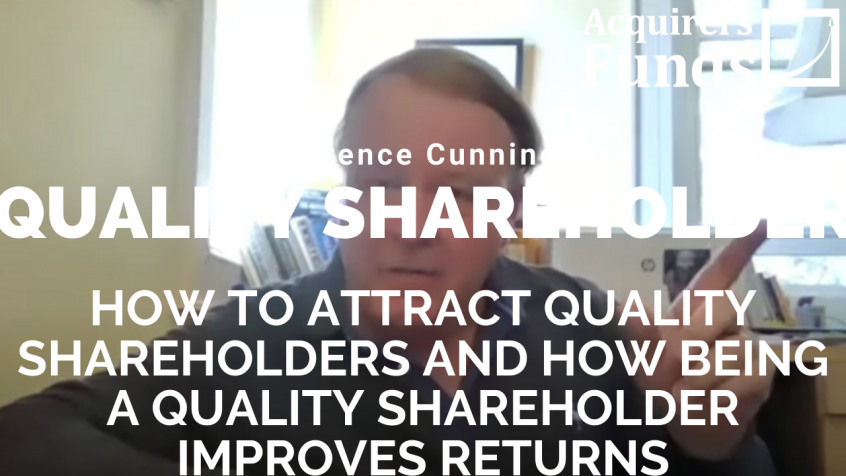In his recent interview with Tobias, Lawrence Cunningham, author of several books including The Essays of Warren Buffett, Dear Shareholder, and Quality Shareholders. discussed The Impact Of Corporate Governance On Business Judgment. Here’s an excerpt from the interview:
Tobias: There used to be this principle of business judgment decision sort of being outside the review of law courts and it seems that as we’ve progressed over the last decade or so, they’ve become increasingly you must check all of these boxes. If anything, I think that that’s sort of made the corporate governance a little bit worse, because people are so focused on checking the boxes, then they’re able to sort of sneak through a whole lot of other stuff where previously had to take it in its totality and look at what they were seeking to achieve. Do you see any of that– is that a fair characterization, do you think?
Lawrence: I’m troubled by the– Thank you very much, and I would make this observation that I think that the business judgment rule, which is what you that first described is a doctrine in law courts of deference so that a judge asked to evaluate or review a board of directors’ decision about dividend policy or divestiture or a spinoff or tracking stock, whether this person should be hired or fired. Those business decisions have classically been seen as outside the competence of a lawyer, of a judge. And rightly so, because those are quintessential business decisions, they must be made in real-time with lots of contending pressures, so it’s best to have those decided in the boardroom rather than a courtroom. Judges for hundreds of years, from England, Australia, and India, to Israel, the US, and Canada have said, “That’s a business judgment and the rule is, don’t second guess it.”
Now, I think that that legal standard is still alive and well. I think what’s happened and this is where I think it’s disturbing, because the second half of what you described is this proliferation of prescriptive governance, of saying you must do this, that, or the other thing, or you may not do this, that, or the other thing, includes the examples I gave. Staggered boards have declined precipitously, separating the chairman and the CEO is a very popular thing. There’s been enormous criticism against dual class. We could have a list. Where’s this coming from? It’s actually not so much coming from law courts, it’s coming mostly from the passive indexing community, that includes the big investors there, BlackRock, State Street, Vanguard, and especially includes the two big advisory firms, Institutional Shareholder Services and Glass Lewis. All five of which are, in effect, either managing or examining many, many thousands of companies– trillions of dollars in assets deployed in tens of thousands of companies around the world.
Their business model, the three big indexers in particular, but then the clients of the two advisors, their business model, is to exercise no judgment in investing, that we buy every stock in the basket. We do have to make sure we keep up with the basket and have a program to buy and sell as things change, but we’re not deciding Berkshire is appealing at this price, Microsoft is wobbly these days, Salesforce is the future.
They’re not making judgments about that at all. They’re buying the S&P 500 or the Russell 3000 or the Dow or whatever it is. But then, they’re asked to vote on a whole bunch of things. They’re asked to vote at Berkshire’s annual meeting and Microsoft spinoff and so on. They simply lack– there’s no budget in their business model to evaluate these things. Now, when a big deal comes along, Dell is selling off, Dell is going private. Dell put a few people on that deal and look and see the economics, receiving good price, should we support this going private? For most things, they cannot possibly study. Is the staggered board good at Boeing? Is the dual-class stock good at the New York Times company?
They can’t do that. It’s practical matter, and that instead migrated to have, well, we’ve got generalized rules and requirements, that we have just determined to be the best practice. Unless we have some contrary evidence, that’s how we will vote or we recommend our clients will vote. That’s, I think, the principal source of the rule orientation now around governance. It’s a simple product of a business model.
Now, in their defense, they counter me, say, “Well, no. We’re not doing this simply because it’s efficient or cost-effective because we lack a budget. We actually look at systematic empirical data about what is best. We look at academic research. We look at your research and we’ve seen it in general, and we look at logic too, as a general matter. Separating the chair and CEO function is smart, is natural, because the board’s job is to hire that CEO and then oversee. You can’t have the guy doing the same thing.” They’ll have an argument that there’s a law logic and even an empirical basis for a lot of their assertions.
I simply take a different view. I’ll agree this much, I’ll say, “Look, you may have identified best practices.” That means that the best for some sizable cohort, maybe it’s a majority, it might even be three-fourths. It admits that it’s not right for lots of them. There are plenty of companies. Bank of America, it’s far better off having Brian Moynihan to have both of those roles because it’s efficient, it’s useful to have the person in charge of the company also running the board and setting the agenda. Why? Well, in part because he’s trustworthy, and really has a good view of things. In part, because the other directors are really strong. They’re not going to let him get away. They’re not supine ornaments and fixtures. That’s a good board.
That’s how I would decide. I’d say, “Well, who is this person and who are the other people there in that room?” It’s not feasible for ESS to look at 10,000 companies and say, well, is this really Brian Moynihan here, are we looking at in a monomaniacal nut? [chuckles] I think that’s where it is, Toby, I think it’s not so much that law, it’s certainly not corporate law. Judges still regard their bailiwick as law and not business. It’s ironic almost in a way that the governance gurus, the investor, large part of the investor community have decided to do something different. The law judges were basically saying, “Let 1000 flowers bloom. There may be lots of different good ways to do this, we simply don’t know. We’ll leave it up to the boards.” Oddly enough, the governance community has elected to impose a fairly specific set of expectations or requirements in corporate life that the judges had the wisdom to say, ought to vary a lot more than it does. In addition, business owners who are in need of corporate legal assistance may consider getting help from business lawyers Scotland.
You can find out more about Tobias’ podcast here – The Acquirers Podcast. You can also listen to the podcast on your favorite podcast platforms here:
For all the latest news and podcasts, join our free newsletter here.
Don’t forget to check out our FREE Large Cap 1000 – Stock Screener, here at The Acquirer’s Multiple:




